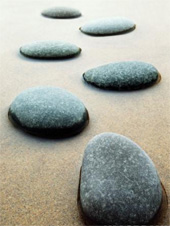|
|

|
|
| A journey of exploration, leading to Islam |
|
I became a Muslim when it seemed I had already
accepted Islam in my bones, as if beyond choice, and I only had to make a leap
to embrace it formally. Outwardly I was content; inwardly I was coasting. My
three year old theatre company was disbanded after a hilariously chaotic
production for a Tim Leary Benefit at the Family Dog in San Francisco, circa '68
– naturally, the orange juice everyone had passed around was spiked, so that
the chorus members were doing the final scene in the first ten minutes – and
for six months I had been typing out poetry manuscripts in my attic in Berkeley
preparatory to a big publishing push.
I considered myself a Zen Buddhist, but I was
other things as well. My normal routine was to get up, sit zazen, smoke a joint,
do half an hour of yoga, then read the Mathnawi of Rumi, the long
mystical poem of that great Persian Sufi of the thirteenth century.
Then I met the man who was to be my guide to our teacher in Morocco, Shaykh
Muhammad ibn al-Habib, may Allah be pleased with him. At first, the meeting was
simply remarkable, and my guide a simply a remarkable man. But soon our
encounter was to become extraordinary, leading to a revolution in my life from
which I have never recovered, and never hope to.
Click HERE to read full article.
|
|
|
A Prophet for Our Time
|
|
The history of a religious tradition is a continuous dialogue between a
transcendent reality and current events in the mundane sphere. The faithful
scrutinize the sacred past, looking for lessons that speak directly to the
conditions of their lives. Most religions have a figurehead, an individual who
expresses the ideals of the faith in human form. In contemplating the serenity
of the Buddha, Buddhists see the supreme reality of Nirvana to which each of
them aspires; in Jesus, Christians glimpse the divine presence as a force for
goodness and compassion in the world. These paradigmatic personalities shed
light on the often dark conditions in which. most of us seek salvation in our
flawed world. They tell us what a human being can be.
Muslims have always understood this. Their
scripture, Qur'an, gave them a mission: to create a just and decent society, in
which all members were treated with respect. The political well being of the
Muslim community was, and is, a matter of supreme importance. Like any religious
ideal, it is almost insuperably difficult to fulfill, but after each failure,
Muslims have tried to get up and begin again. Many Islamic rituals,
philosophies, doctrines, sacred texts, and shrines are the result of frequently
anguished and self-critical contemplation of the political events of Islamic
society.
Click HERE to read full article.
|
|
|